| Listing 1 - 10 of 10 |
Sort by
|
Multi
ISBN: 9780521877732 0521877733 9780521701655 0521701651 9780511781131 1107218861 0511993706 9786612967238 0511991509 0511990529 0511992491 0511986904 051178113X 1282967231 0511988702 9780511992490 6612967234 9780511988707 9781107218864 9780511993701 9781282967236 9780511991509 9780511990526 9780511986901 Year: 2011 Publisher: Cambridge New York Cambridge University Press
Abstract | Keywords | Export | Availability | Bookmark
 Loading...
Loading...Choose an application
- Reference Manager
- EndNote
- RefWorks (Direct export to RefWorks)
"Throughout much of history, a critical driving force behind global economic development has been the response of society to the scarcity of key natural resources. Increasing scarcity raises the cost of exploiting existing natural resources and creates incentives in all economies to innovate and conserve more of these resources. However, economies have also responded to increasing scarcity by obtaining and developing more of these resources. Since the agricultural transition over 12,000 years ago, this exploitation of new 'frontiers' has often proved to be a pivotal human response to natural resource scarcity. This book provides a fascinating account of the contribution that natural resource exploitation has made to economic development in key eras of world history. This not only fills an important gap in the literature on economic history but also shows how we can draw lessons from these past epochs for attaining sustainable economic development in the world today"--
World history --- Agriculture --- Natural resources. --- Scarcity. --- Economic development. --- Economic aspects --- History. --- -Natural resources --- Scarcity --- Economic development --- AA / International- internationaal --- 331.100 --- 331.11 --- 338.013 --- Development, Economic --- Economic growth --- Growth, Economic --- Economic policy --- Economics --- Statics and dynamics (Social sciences) --- Development economics --- Resource curse --- Deficiency --- Shortages --- National resources --- Natural resources --- Resources, Natural --- Resource-based communities --- Farming --- Husbandry --- Industrial arts --- Life sciences --- Food supply --- Land use, Rural --- -History --- Economische geschiedenis: algemeenheden. --- Geschiedenis van de landbouw. --- Belang, verdeling en beleid van de natuurlijke rijkdommen. Grondstoffen. --- Economic aspects&delete& --- History --- Economische geschiedenis: algemeenheden --- Geschiedenis van de landbouw --- Belang, verdeling en beleid van de natuurlijke rijkdommen. Grondstoffen --- Business, Economy and Management
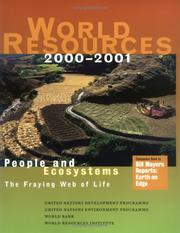
ISBN: 1569734437 9781569734438 0080437818 9780080437811 0080543863 1282285041 9786612285042 Year: 2000 Publisher: Washington, DC : World Resources Institute,
Abstract | Keywords | Export | Availability | Bookmark
 Loading...
Loading...Choose an application
- Reference Manager
- EndNote
- RefWorks (Direct export to RefWorks)
World Resources 2000-2001, People and Ecosystems: The Fraying Web of Life focuses on the critical link between ecosystems and people and provides an overview of current global environmental and economic trends using hundreds of indicators in more than 150 countries. Until now there has not been a comprehensive, formalised process to assess human damage to our ecosystems, to establish a baseline for future actions, or to disseminate information that would aid the formulation of better policies world-wide. This book is the first reliable, comprehensive base of evidence fo
Natural resources --- Environmental health. --- Environmental degradation --- Human beings --- Hygiène du milieu --- Homme --- Health aspects. --- Effect of environment on. --- Influence de l'environnement --- AA / International- internationaal --- 338.013 --- 351.2 --- 355 --- 338.724 --- Belang, verdeling en beleid van de natuurlijke rijkdommen. Grondstoffen --- Openbare gezondheid. Milieubescherming. Milieuvervuiling --- Milieu --- Teelten --- Environmental engineering. --- Biotic communities. --- Nature --- Effect of human beings on. --- International cooperation.
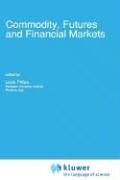
ISBN: 0792310438 9401054827 9401133549 9780792310433 Year: 1991 Volume: 21 Publisher: Dordrecht : Springer Netherlands : Imprint: Springer,
Abstract | Keywords | Export | Availability | Bookmark
 Loading...
Loading...Choose an application
- Reference Manager
- EndNote
- RefWorks (Direct export to RefWorks)
Louis Phlips The stabilisation of primary commodity prices, and the related issue of the stabilisation of export earnings of developing countries, have traditionally been studied without reference to the futures markets (that exist or could exist) for these commodities. These futures markets have in turn been s~udied in isolation. The same is true for the new developments on financial markets. Over the last few years, in particular sine the 1985 tin crisis and the October 1987 stock exchange crisis, it has become evident that there are inter actions between commodity, futures, and financial markets and that these inter actions are very important. The more so as trade on futures and financial markets has shown a spectacular increase. This volume brings together a number of recent and unpublished papers on these interactions by leading specialists (and their students). A first set of papers examines how the use of futures markets could help stabilising export earnings of developing countries and how this compares to the rather unsuccessful UNCTAD type interventions via buffer stocks, pegged prices and cartels. A second set of papers faces the fact, largely ignored in the literature, that commodity prices are determined in foreign currencies, with the result that developing countries suffer from the volatility of exchange rates of these currencies (even in cases where commodity prices are relatively stable). Financial markets are thus explicitly linked to futures and commodity markets.
Trade theory --- International finance --- Developing countries --- Commodity exchanges --- Financial futures --- Bourses de marchandises --- Marchés à terme d'instruments financiers --- AA / International- internationaal --- 338.013 --- 380.22 --- 305.92 --- 303.8 --- 333.642 --- 333.450 --- Belang, verdeling en beleid van de natuurlijke rijkdommen. Grondstoffen. --- Concurrentie. Monopolie, duopolie, oligopolie. --- Econometrie van de internationale handel. Handelsbalans, betalingsbalans. Wissel. --- Econometrische behandeling van een onderwerp. --- Termijn. Financial futures. --- Theorie van het deviezenverkeer. Theorie van de koopkrachtpariteit. --- Marchés à terme d'instruments financiers --- Futures, Financial --- Commodities exchange --- Commodity markets --- Exchanges, Commodity --- Exchanges, Produce --- Produce exchanges --- Econometrische behandeling van een onderwerp --- Econometrie van de internationale handel. Handelsbalans, betalingsbalans. Wissel --- Theorie van het deviezenverkeer. Theorie van de koopkrachtpariteit --- Termijn. Financial futures --- Belang, verdeling en beleid van de natuurlijke rijkdommen. Grondstoffen --- Concurrentie. Monopolie, duopolie, oligopolie --- Futures --- Hedging (Finance) --- Futures market --- Commercial products --- Produce trade --- Speculation --- Econometrics. --- Microeconomics. --- Economics.
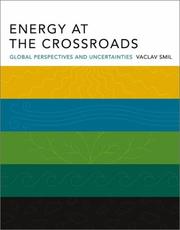
ISBN: 0262194929 0262283840 1423725476 9780262283847 9780262194921 0262693240 9780262693240 9781423725473 026230368X Year: 2003 Publisher: Cambridge, Massachusetts [Piscataqay, New Jersey] MIT Press IEEE Xplore
Abstract | Keywords | Export | Availability | Bookmark
 Loading...
Loading...Choose an application
- Reference Manager
- EndNote
- RefWorks (Direct export to RefWorks)
In Energy at the Crossroads, Vaclav Smil considers the twenty-first century's crucial question: how to reconcile the modern world's unceasing demand for energy with the absolute necessity to preserve the integrity of the biosphere. With this book he offers a comprehensive, accessible guide to today's complex energy issues -- how to think clearly and logically about what is possible and what is desirable in our energy future.After a century of unprecedented production growth, technical innovation, and expanded consumption, the world faces a number of critical energy challenges arising from unequal resource distribution, changing demand patterns, and environmental limitations. The fundamental message of Energy at the Crossroads is that our dependence on fossil fuels must be reduced not because of any imminent resource shortages but because the widespread burning of oil, coal, and natural gas damages the biosphere and presents increasing economic and security problems as the world relies on more expensive supplies and Middle Eastern crude oil.Smil begins with an overview of the twentieth century's long-term trends and achievements in energy production. He then discusses energy prices, the real cost of energy, and "energy linkages" -- the effect energy issues have on the economy, on quality of life, on the environment, and in wartime. He discusses the pitfalls of forecasting, giving many examples of failed predictions and showing that unexpected events can disprove complex models. And he examines the pros and cons not only of fossil fuels but also of alternative fuels such as hydroenergy, biomass energy, wind power, and solar power. Finally, he considers the future, focusing on what really matters, what works, what is realistic, and which outcomes are most desirable.
AA / International- internationaal --- 338.731 --- 338.013 --- 338.012 --- 338.753.0 --- 338.730 --- 338.732 --- 351.2 --- 338.733 --- Aardolie. Aardolieschok. --- Belang, verdeling en beleid van de natuurlijke rijkdommen. Grondstoffen. --- Energie (productiefactor). --- Energie: algemeenheden. --- Extractieve nijverheid: algemeenheden. --- Gas. --- Openbare gezondheid. Milieubescherming. Milieuvervuiling. --- Steenkool. Steenkoolhoudende mineralen. Vaste brandstoffen. --- Energy policy. --- Energy policy --- Energy development --- Globalization --- Power resources --- Petroleum industry and trade --- History, Modern. --- Environmental aspects. --- Technological innovations. --- Political aspects --- History. --- Agrotechnology and Food Sciences. Engineering --- Energy --- Energy. --- Modern history --- World history, Modern --- Energy resources --- Power supply --- Energy resources development --- Energy source development --- Power resources development --- Energy and state --- State and energy --- Government policy --- World history --- Energy industries --- Oil industries --- Natural resources --- Energy harvesting --- Industrial policy --- Energy conservation --- History, Modern --- Technological innovations --- Environmental aspects --- Political aspects&delete& --- History --- Energie (productiefactor) --- Belang, verdeling en beleid van de natuurlijke rijkdommen. Grondstoffen --- Extractieve nijverheid: algemeenheden --- Aardolie. Aardolieschok --- Gas --- Steenkool. Steenkoolhoudende mineralen. Vaste brandstoffen --- Energie: algemeenheden --- Openbare gezondheid. Milieubescherming. Milieuvervuiling --- E-books --- ENVIRONMENT/Energy --- ENVIRONMENT/General --- Monograph
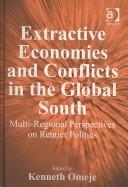
ISBN: 0754670759 9786611766009 1281766003 0754688763 1351158384 9780829887107 1351158406 1351158392 0815388977 1138356913 9780754688761 9781351158398 6611766006 9780754670759 6611766006 1409498808 1351158376 1138622168 9781351158404 9781351158381 9781281766007 Year: 2008 Publisher: Aldershot, England ; Burlington, VT : Ashgate,
Abstract | Keywords | Export | Availability | Bookmark
 Loading...
Loading...Choose an application
- Reference Manager
- EndNote
- RefWorks (Direct export to RefWorks)
The majority of developing countries in the Global South are rich in natural resources, but blighted by excruciating poverty and conflicts. Case study rich, this book critically explores the theories of rentier economies and natural resource conflicts, as well as the practical ramifications of rentier politics in the Global South.
Petroleum industry and trade. --- Petroleum industry and trade --- Mineral industries --- Social conflict --- Wealth --- Investment & Speculation --- Industries --- Business & Economics --- Finance --- Affluence --- Distribution of wealth --- Fortunes --- Riches --- Class conflict --- Class struggle --- Conflict, Social --- Social tensions --- Extractive industries --- Extractive industry --- Metal industries --- Mines and mining --- Mining --- Mining industry --- Mining industry and finance --- Business --- Economics --- Capital --- Money --- Property --- Well-being --- Interpersonal conflict --- Social psychology --- Sociology --- Energy industries --- Oil industries --- 323.2 --- 327.8 --- 338.011 --- 338.013 --- 338.730 --- AA / International- internationaal --- LDC / Developping Countries - Pays En Développement --- Politieke strijd en troebelen --- Oorlog --- Rentetheorie. Wet van de toenemende en afnemende rendementen --- Belang, verdeling en beleid van de natuurlijke rijkdommen. Grondstoffen --- Extractieve nijverheid: algemeenheden
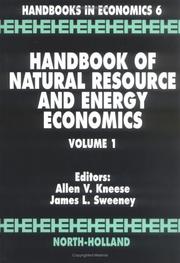
ISBN: 0444876464 0444876448 0444876456 0444878009 9780444876447 9786611120061 1281120065 0080548555 9780080548555 9780444878007 9780444876461 9780444876454 Year: 1993 Volume: 6 Publisher: Amsterdam ; New York : New York, N.Y., U.S.A. : North-Holland ; Sole distributors for the U.S.A. and Canada, Elsevier Science Pub. Co.,
Abstract | Keywords | Export | Availability | Bookmark
 Loading...
Loading...Choose an application
- Reference Manager
- EndNote
- RefWorks (Direct export to RefWorks)
Handbook of Natural Resource and Energy
National wealth --- Relation between energy and economics --- Conservation of natural resources --- Energy industries --- Environmental protection --- Natural resources --- Power resources --- Conservation des ressources naturelles --- Industries énergétiques --- Environnement --- Ressources naturelles --- Ressources énergétiques --- Protection --- 338.012 --- 338.013 --- 338.753.0 --- 351.2 --- 355 --- AA / International- internationaal --- Energy --- Energy resources --- Power supply --- Energy harvesting --- National resources --- Resources, Natural --- Resource-based communities --- Resource curse --- Environmental quality management --- Protection of environment --- Environmental sciences --- Applied ecology --- Environmental engineering --- Environmental policy --- Environmental quality --- Industries --- Conservation of resources --- Natural resources conservation --- Resources conservation, Natural --- Natural resources conservation areas --- Energie (productiefactor) --- Belang, verdeling en beleid van de natuurlijke rijkdommen. Grondstoffen --- Energie: algemeenheden --- Openbare gezondheid. Milieubescherming. Milieuvervuiling --- Milieu --- Economic aspects --- Conservation --- Energie (productiefactor). --- Conservation of natural resources. --- Energy industries. --- Environmental protection. --- Natural resources. --- Power resources. --- Industries énergétiques --- Ressources énergétiques --- E-books --- Gestion --- Aspects économiques
Book
ISBN: 9780521148085 9780521765770 0521765773 0521148081 9780511779435 1139035908 1107208793 9786613053916 1139041363 1139042130 1139040596 1139038222 0511779437 1283053918 1139044761 9781139040594 9781139042130 9781139041362 Year: 2010 Publisher: New York
Abstract | Keywords | Export | Availability | Bookmark
 Loading...
Loading...Choose an application
- Reference Manager
- EndNote
- RefWorks (Direct export to RefWorks)
"This book makes two central claims: first, that mineral-rich states are cursed not by their wealth but, rather, by the ownership structure they choose to manage their mineral wealth and second, that weak institutions are not inevitable in mineral-rich states. Each represents a significant departure from the conventional resource curse literature, which has treated ownership structure as a constant across time and space and has presumed that mineral-rich countries are incapable of either building or sustaining strong institutions - particularly fiscal regimes. The experience of the five petroleum-rich Soviet successor states (Azerbaijan, Kazakhstan, the Russian Federation, Turkmenistan, and Uzbekistan) provides a clear challenge to both of these assumptions. Their respective developmental trajectories since independence demonstrate not only that ownership structure can vary even across countries that share the same institutional legacy but also that this variation helps to explain the divergence in their subsequent fiscal regimes"--Provided by publisher. "This book makes two central claims: First, that mineral-rich states are cursed not by their wealth per se but rather by the ownership structure they chose to manage their mineral wealth; and second, that weak institutions are not inevitable in mineral-rich states. Each claim represents a significant departure from the conventional 'resource curse' literature, which has treated ownership structure as a constant across time and space and presumed that mineral-rich countries are incapable of either building or sustaining strong institutions - particularly fiscal regimes. The experience of the five petroleum-rich Soviet successor states (Azerbaijan, Kazakhstan, the Russian Federation, Turkmenistan, and Uzbekistan) provides a clear challenge to both of these assumptions. Their respective developmental trajectories since independence demonstrate not only that ownership structure can vary even across countries that share the same institutional legacy, but also that this variation helps explain the divergence in their subsequent fiscal regimes"--Provided by publisher.
Relation between energy and economics --- Organization theory --- Russia --- Commonwealth of Independent States --- Petroleum industry and trade --- 338.013 --- 338.047 --- 338.731 --- CIS / Commonwealth Of Independant States - Gos - Cei --- Belang, verdeling en beleid van de natuurlijke rijkdommen. Grondstoffen --- Privé en openbare bedrijven. Openbare diensten. Gemengde economie --- Aardolie. Aardolieschok --- Social Sciences --- Political Science --- Petroleum industry and trade - Soviet Union --- Commonwealth of Independent States. --- CEI --- CIS --- Communauté des Etats indépendants --- Commonwealth States --- Comunità di Stati indipendenti --- Gemeinschaft Unabhängiger Staaten --- GUS (Commonwealth of Independent States) --- Ḥever ha-ʻAmim --- Ḥever ha-Medinot ha-ʻAtsmaʼiyot --- Itsenäisten valtioiden yhteisö --- IVY (Organization) --- Newly Independent States of the Former Soviet Union --- NIS --- SND --- SNG --- Sodruzhestvo nezavisimykh gosudarstv --- Spivdruz︠h︡nistʹ nezalez︠h︡nykh derz︠h︡av --- Strany Sodruzhestva --- Tongnip Kukka Yŏnhap --- Wspólnota Niepodległych Państw --- ZND --- Zajednica nezavisnih država --- Koinopoliteia Anexartētōn Kratōn
Book
ISBN: 1282352369 9786612352362 0300155670 0300141610 9780300155679 9780300141610 9781282352360 Year: 2009 Publisher: New Haven Yale University Press
Abstract | Keywords | Export | Availability | Bookmark
 Loading...
Loading...Choose an application
- Reference Manager
- EndNote
- RefWorks (Direct export to RefWorks)
Would the world be a better place if human societies were somehow able to curb their desires for material goods? Saleem Ali's pioneering book links human wants and needs by providing a natural history of consumption and materialism with scientific detail and humanistic nuance. It argues that simply disavowing consumption of materials is not likely to help in planning for a resource-scarce future, given global inequality, development imperatives, and our goals for a democratic global society. Rather than suppress the creativity and desire to discover that is often embedded in the exploration and production of material goods-which he calls "the treasure impulse"-Ali proposes a new environmental paradigm, one that accepts our need to consume "treasure" for cultural and developmental reasons, but warns of our concomitant need to conserve. In evaluating the impact of treasure consumption on resource-rich countries, he argues that there is a way to consume responsibly and alleviate global poverty.
Consumption (Economics) --- Sustainable development. --- Environmental policy. --- Natural resources --- Raw materials --- Conservation of natural resources. --- Environmental aspects. --- Moral and ethical aspects. --- Conservation of resources --- Natural resources conservation --- Resources conservation, Natural --- National resources --- Resources, Natural --- Environment and state --- Environmental control --- Environmental management --- Environmental protection --- Environmental quality --- State and environment --- Development, Sustainable --- Ecologically sustainable development --- Economic development, Sustainable --- Economic sustainability --- ESD (Ecologically sustainable development) --- Smart growth --- Sustainable development --- Sustainable economic development --- Consumer demand --- Consumer spending --- Consumerism --- Spending, Consumer --- Conservation --- Economic aspects --- Government policy --- Environmental aspects --- Natural resources conservation areas --- Primary commodities --- Resource-based communities --- Resource curse --- Environmental auditing --- Economic development --- Demand (Economic theory) --- Conservation of natural resources --- Environmental policy --- 174 --- 313 --- 338.013 --- 339.320 --- 355 --- AA / International- internationaal --- Moral and ethical aspects --- Verband tussen de ethiek en de economie. Ethiek en bedrijf --- Levenswijze en levensstandaard. Levensminimum. sociale indicatoren (Studiën) --- Belang, verdeling en beleid van de natuurlijke rijkdommen. Grondstoffen --- Consumptie: algemeenheden. Wet van de vraag in verband met de consumptie. Consumptiebehoefte. Behoeftetheorie --- Milieu
Book
ISBN: 9028932038 9789028932036 Year: 2002 Volume: *18 Publisher: Kapellen Pelckmans
Abstract | Keywords | Export | Availability | Bookmark
 Loading...
Loading...Choose an application
- Reference Manager
- EndNote
- RefWorks (Direct export to RefWorks)
Capitalism --- Economics --- Globalization --- Moral and ethical aspects. --- Economic order --- International economic relations --- antiglobalisme --- 330.342.14 --- 339.9 --- globalisering --- inkomensherverdeling --- vrije markteconomie --- welvaart en welzijn --- 354 --- Antiglobalisme --- #ECO:01.01:economie algemeen --- Globalisering --- vrije economie --- 321.4 --- 330.52 --- 330.580 --- 338.013 --- 339.21 --- 351.2 --- 355 --- 382.11 --- AA / International- internationaal --- 339 --- 658.11 --- 241 Hedendaagse wereldproblemen --- 658.11 Kinds and forms of enterprise --- Kinds and forms of enterprise --- 330.342.14 Kapitalistische economie. Free enterprise. Markteconomie. Vrije concurrentie --- Kapitalistische economie. Free enterprise. Markteconomie. Vrije concurrentie --- 339.9 Buitenlandse economische betrekkingen. Internationale economische betrekkingen --- Buitenlandse economische betrekkingen. Internationale economische betrekkingen --- Economic theory --- Political economy --- Social sciences --- Economic man --- 339 Handel. Internationale economische betrekkingen. Wereldeconomie --binnenlandse als buitenlandse handel; zie ook {339.3} en {339.5} --- Handel. Internationale economische betrekkingen. Wereldeconomie --binnenlandse als buitenlandse handel; zie ook {339.3} en {339.5} --- Moral and ethical aspects --- globalisation --- redistribution des revenus --- economie de marche libre --- prosperite et bien etre --- Internationale economische politiek --- 327 --- 330.1 --- Internationale economie --- Democratie --- Liberaal systeem. Neo-liberalisme. Theorie van de onderhandeling --- Gecontroleerde economie. Geleide economie. Welvaarststaat. Algemeenheden --- Belang, verdeling en beleid van de natuurlijke rijkdommen. Grondstoffen --- Ongelijkheid en herverdeling van vermogens en inkomens. Inkomensbeleid --- Openbare gezondheid. Milieubescherming. Milieuvervuiling --- Milieu --- Theorie van het internationale evenwicht. Economische onafhankelijkheid van een natie. Globalisering. Mondialisering --- Internationalisering --- Economie --- Welvaart --- Politiek --- Maatschappij --- Film --- Aardrijkskunde
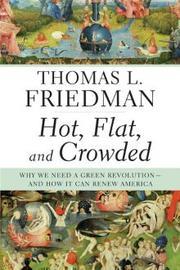
ISBN: 9781846141294 9781846141638 9780374166854 Year: 2008 Publisher: London Allen Lane
Abstract | Keywords | Export | Availability | Bookmark
 Loading...
Loading...Choose an application
- Reference Manager
- EndNote
- RefWorks (Direct export to RefWorks)
Examines America's loss of focus and national purpose since 9/11, and the global environmental crisis, and shows how the solutions to these two problems are linked.
Climatic changes --- Energy policy --- Environmental policy --- Green movement --- Green technology --- Power resources --- developpement durable --- situation economique --- 203 --- 338.012 --- 338.013 --- 351.2 --- 355 --- AA / International- internationaal --- CN / China - Chine --- US / United States of America - USA - Verenigde Staten - Etats Unis --- 502.5 --- 500 Milieu --- Earth-friendly technology --- Environmental technology --- Technology --- Changes, Climatic --- Climate change --- Climate changes --- Climate variations --- Climatic change --- Climatic fluctuations --- Climatic variations --- Global climate changes --- Global climatic changes --- Climatology --- Climate change mitigation --- Teleconnections (Climatology) --- 502.5 The nature complex as a whole. Balance. Danger. Damage. Threat of destruction --- The nature complex as a whole. Balance. Danger. Damage. Threat of destruction --- Environmental aspects --- duurzame ontwikkeling --- economische toestand --- Sociografie. Algemene beschrijving van de gemeenschappen (Sociologie) --- Energie (productiefactor). --- Belang, verdeling en beleid van de natuurlijke rijkdommen. Grondstoffen --- Openbare gezondheid. Milieubescherming. Milieuvervuiling --- Milieu --- United States --- U.S.A. --- Jungtinės Amerikos valstybės --- Soedinennye Shtaty Si︠e︡vernoĭ Ameriki --- Soedinennye Shtaty Severnoĭ Ameriki --- Si︠e︡vero-Amerikanskīe Soedinennye Shtaty --- Severo-Amerikanskie Soedinennye Shtaty --- Zlucheni Derz︠h︡avy --- USA --- US --- Arhab --- Ar. ha-B. --- Artsot ha-Berit --- ولايات المتحدة الامريكية --- Wilāyāt al-Muttaḥidah al-Amirīkīyah --- ABSh --- Amerika Birlăshmish Shtatlary --- ABŞ --- Amerika Birlăşmi Ştatları --- Forente stater --- Spojené staty americké --- Severo-Amerikanskie Shtaty --- Sjedinjene Američke Države --- Zʹi︠e︡dnani Derz︠h︡avy Ameryky --- Amerikai Egyesült Államok --- Yhdysvallat --- Verenigde Staten --- Egyesült Államok --- Hiwsisayin Amerikayi Miatsʻeal Tērutʻiwnkʻ --- Estados Unidos de América --- United States of America --- Fareyniḳṭe Shṭaṭn --- Artzois Ha'bris --- Estados Unidos da América do Norte --- SShA --- Soedinennye Shtaty Ameriki --- VSA --- États-Unis d'Amérique --- Vereinigte Staaten von Amerika --- Stati Uniti d'America --- Estados Unidos --- EE.UU. --- Stany Zjednoczone --- ĒPA --- Amerika Qūrama Shtattary --- Amerika Qŭshma Shtatlari --- SAD --- Saharat ʻAmērikā --- Hēnomenai Politeiai Amerikēs --- ZSA --- Mei-kuo --- Meiguo --- Mei guo --- ZDA --- Združene države Amerike --- U.S. --- America (Republic) --- Amirika Carékat --- Verenigde State van Amerika --- VS --- ولايات المتحدة --- Wilāyāt al-Muttaḥidah --- ولايات المتّحدة الأمريكيّة --- Wilāyāt al-Muttaḥidah al-Amrīkīyah --- Estatos Unitos --- Estatos Unitos d'America --- Ètats-Unis d'Amèrica --- Estaos Xuníos d'América --- Estaos Xuníos --- Tetã peteĩ reko Amérikagua --- Istadus Unidus --- Amerika Birlăşmiş Ştatları --- Amerika ka Kelenyalen Jamanaw --- Bí-kok --- Amerika Qushma Shtattary --- AQSh --- Злучаныя Штаты Амерыкі --- Zluchanyi︠a︡ Shtaty Ameryki --- Yunaeted Stet blong Amerika --- Yunaeted Stet --- Vaeinigte Staatn --- Vaeinigte Staatn vo Amerika --- Stadoù-Unanet Amerika --- Sŭedineni amerikanski shtati --- САЩ --- SASht --- Съединените щати --- Sŭedinenite shtati --- Америка (Republic) --- Amerika (Republic) --- Estats Units d'Amèrica --- Америкӑри Пӗрлешӳллӗ Штатсем --- Amerikări Pĕrleshu̇llĕ Shtatsem --- Stati Uniti --- SUA (Stati Uniti d'America) --- Unol Daleithiau America --- Unol Daleithiau --- Amerikas Forenede Stater --- Vereinigte Staaten --- Wááshindoon Bikéyah Ałhidadiidzooígíí --- Zjadnośone staty Ameriki --- Ameerika Ühendriigid --- Ηνωμένες Πολιτείες της Αμερικής --- Hēnōmenes Politeies tēs Amerikēs --- Η.Π.Α. --- Ē.P.A. --- Usono --- Unuiĝintaj Ŝtatoj de Ameriko --- Американь Вейтьсэндявкс Штаттнэ --- Amerikanʹ Veĭtʹsėndi︠a︡vks Shtattnė --- Ameriketako Estatu Batuak --- Feriene Steaten --- Feriene Steaten fan Amearika --- FS --- Stâts Unîts di Americhe --- Stâts Unîts --- Stáit Aontaithe Mheiriceá --- Steatyn Unnaneysit America --- Steatyn Unnaneysit --- S.U.A. --- Na Stàitean Aonaichte --- NSA --- Mî-koet --- 미국 --- Miguk --- Amerikayi Miatsʻyal Nahangner --- Miatsʻyal Nahangner --- Environmental conditions. --- Social conditions --- Changes in climate --- Climate change science --- Ecologie --- Trends --- Toekomstbeeldvorming --- Internationalisering --- Politiek --- Spojené obce severoamerické --- Американь Вейтьсэндявкс Штаттнэ --- Energie (productiefactor) --- Trend --- Toekomstvisie --- Gezondheidszorg --- Druktechniek --- Bouwsector --- Stadsvernieuwing --- Maatschappij --- Film --- Global environmental change --- États-Unis --- É.-U. --- ÉU
| Listing 1 - 10 of 10 |
Sort by
|

 Search
Search Feedback
Feedback About UniCat
About UniCat  Help
Help News
News